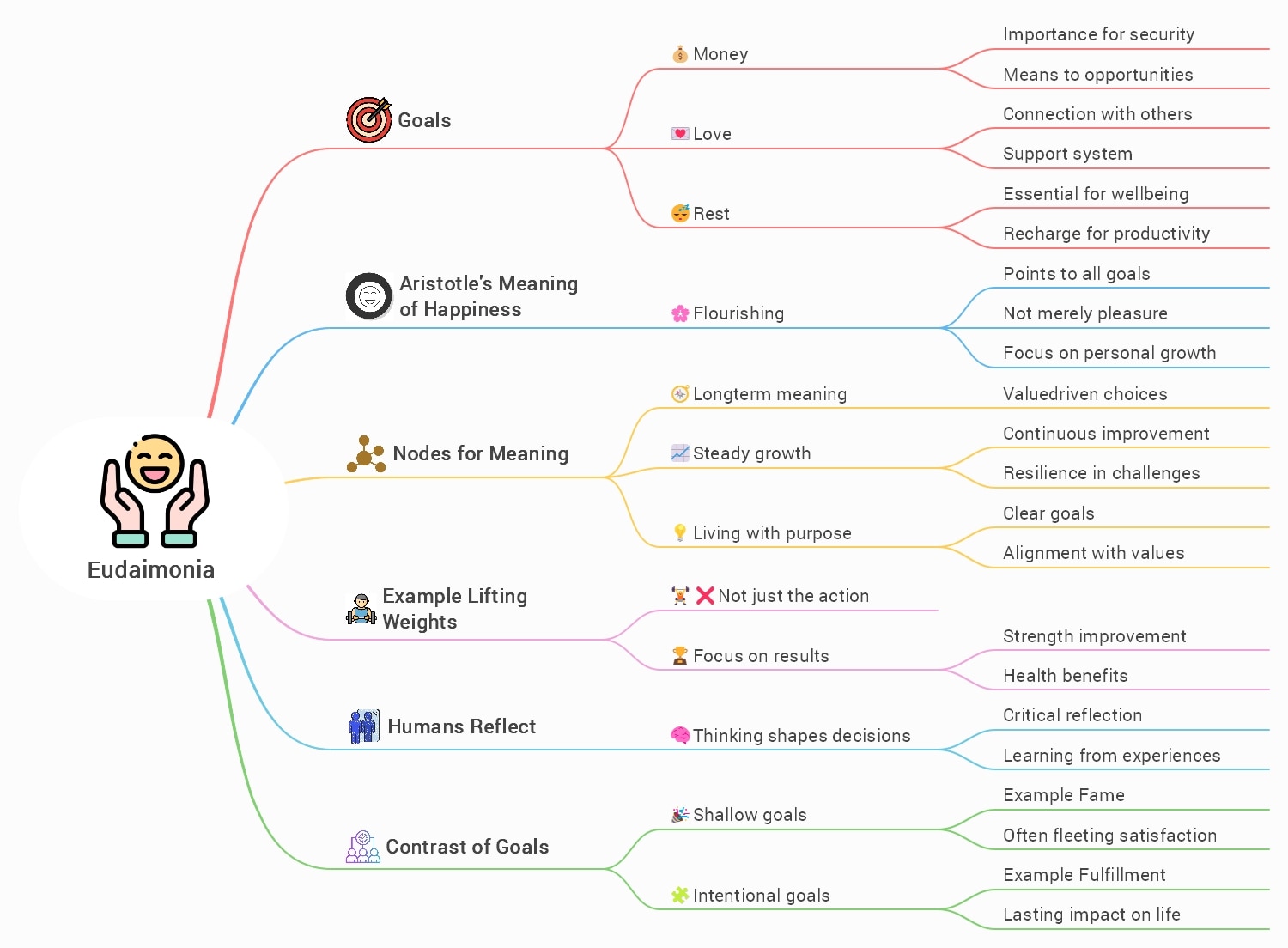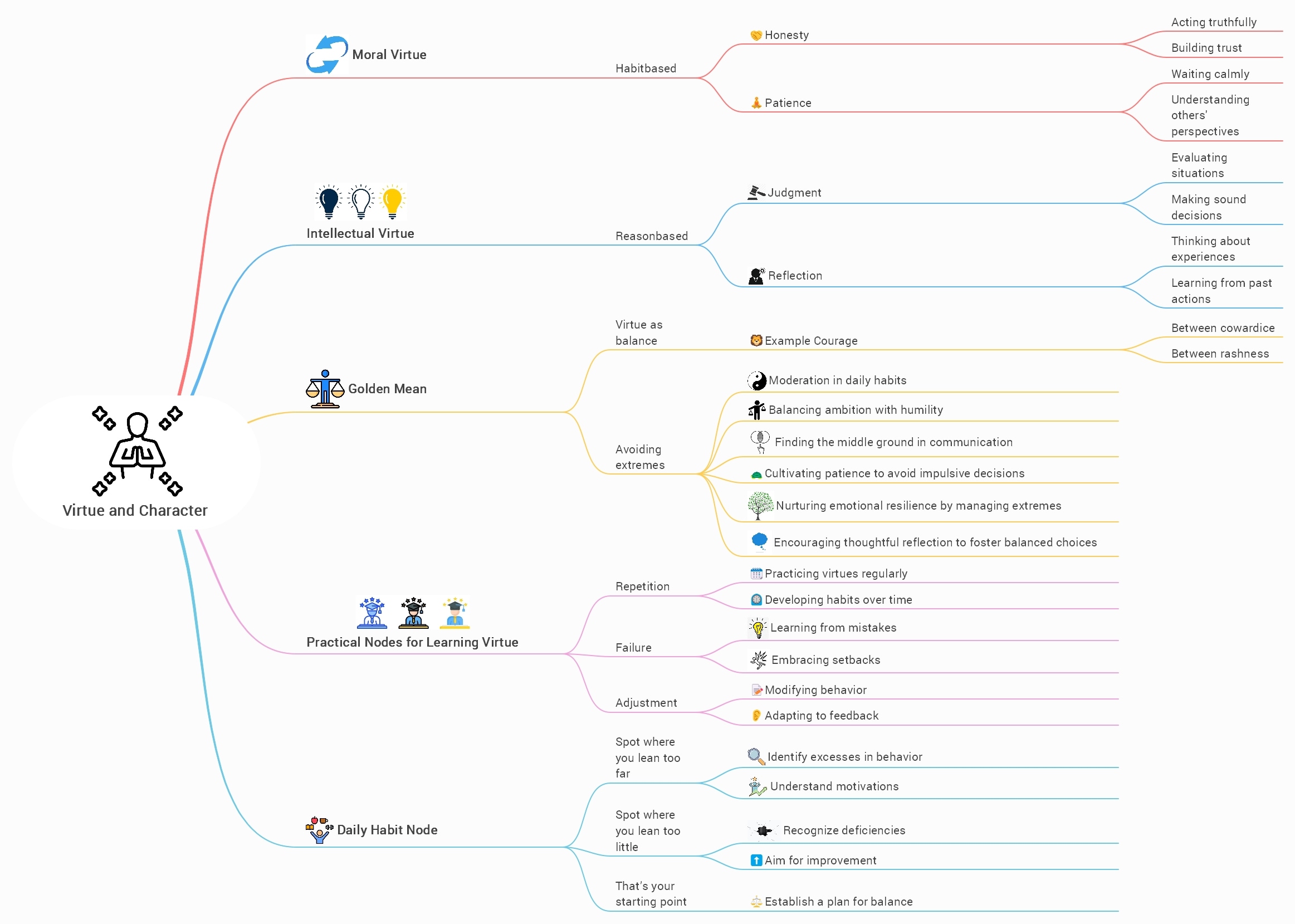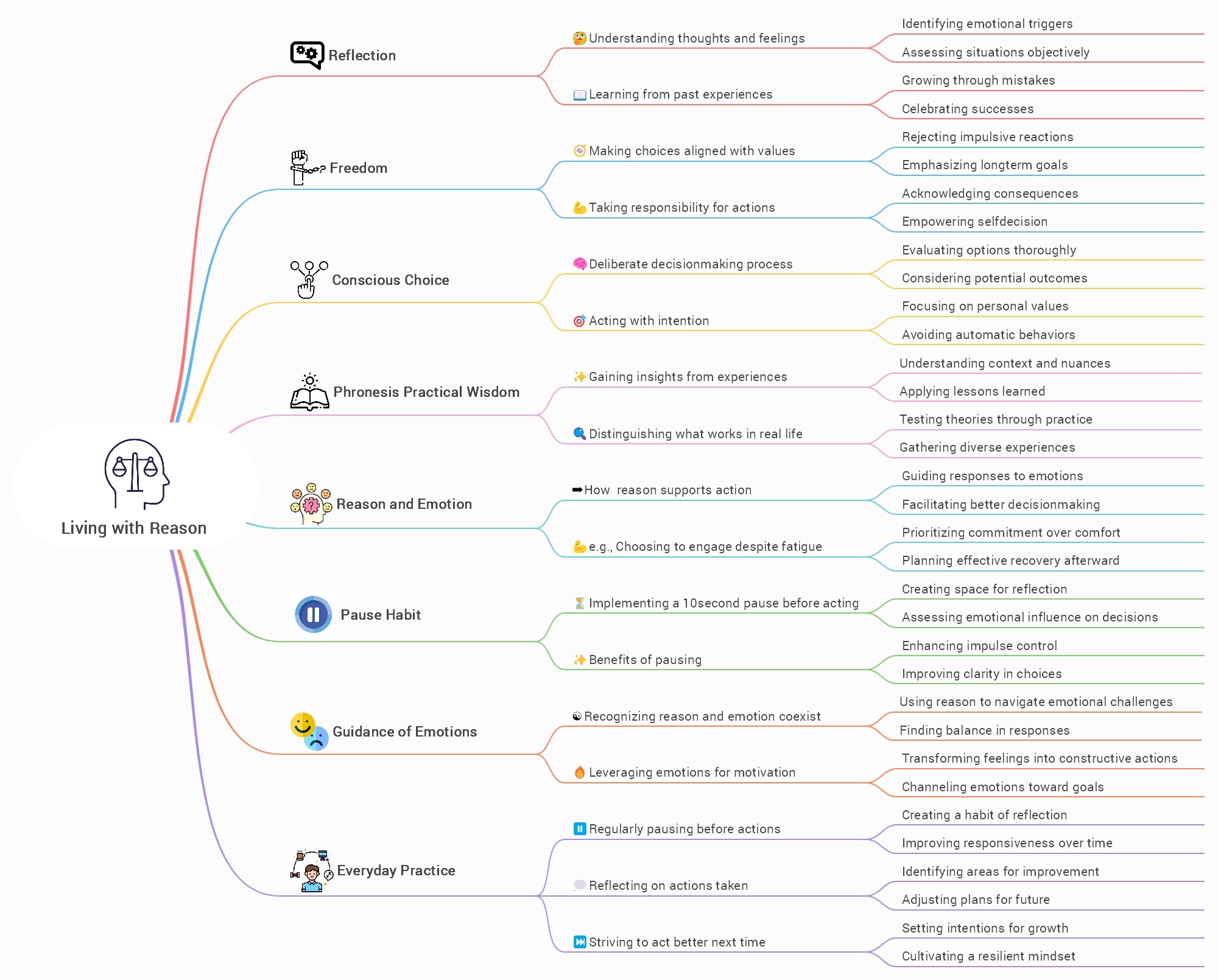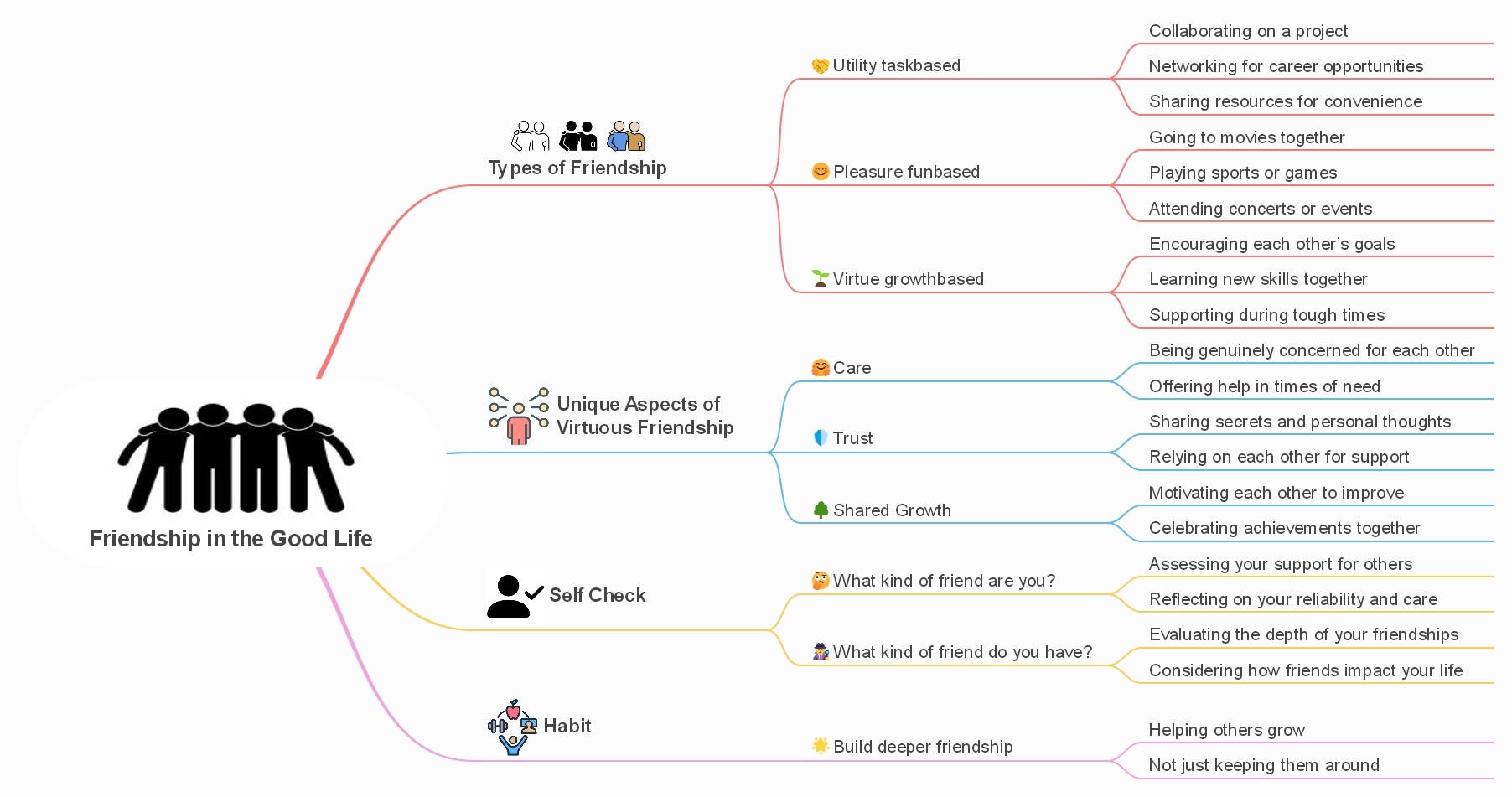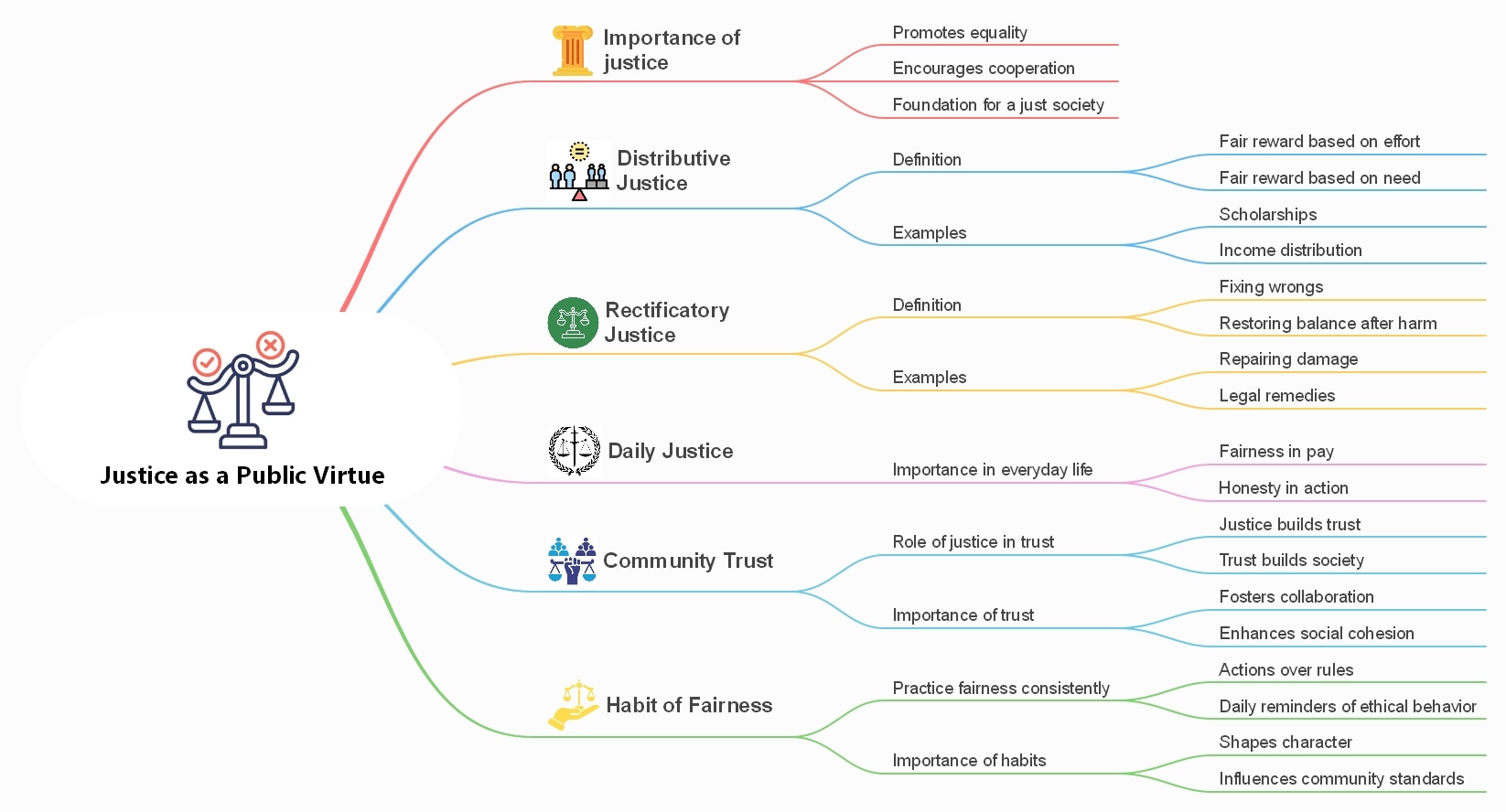Aristotle didn’t write the Nicomachean Ethics for scholars. He wrote it for people trying to live. People with jobs, stress, family, and questions. People like us.
His focus wasn’t “how to be happy” in the modern sense, but how to live a life that feels complete. That means asking concrete and practical questions: What do I value? What habits define me? Am I chasing things that matter?
In this guide, I'll walk you through everything he shared, why happiness isn’t just pleasure, how character is developed, and how reason and friendship make a difference. Let’s get into it, starting with Aristotle’s idea of the good life.
In this article
The Good Life - Happiness as the Ultimate Goal
What Are We Really Chasing
Aristotle believed that every choice we make points toward something we want. Food, money, love, rest, each of these is tied to a goal. But what's the final goal? The one we don't chase to get something else?
For him, it's happiness.
We go to work for a paycheck, and spend that paycheck on things that make us feel safe or fulfilled. But behind all of it, we're after a good life.
The Deep Kind of Happiness
He didn't mean pleasure or fun. He called it eudaimonia, closer to flourishing. It's not a feeling, but a way of living.
Eudaimonia is about becoming who you're meant to be. It's steady, not fleeting. You build it over time.
A Quick Example
You don't lift weights just to lift weights. You want to feel strong. You want to move with ease. The exercise is just a tool.
Pleasure Isn't the Point
Eating dessert feels good. But Aristotle says that's not enough. Real happiness isn't about short-term pleasure. It's about living with meaning.
Baking that cake, learning a skill, feeding people you love, that's closer to the kind of life that lasts.
Humans Are Thinkers
We're not like animals or trees. We can reflect on our actions. We can ask ourselves: Is this the life I want?
That ability to think is key. It's what lets us shape our choices.
A person who plays music just for fame is chasing something shallow. But the one who plays because it feels like home, that's someone living with intention.
Virtue - The Key to Living Well
What Is Virtue?
Aristotle believed that to live well, one needs to develop character. Not chase prizes. Virtue is how you shape that character. You aren't born with it. It doesn't just happen. You learn it by doing what's right, at the right time, with the right purpose. And you repeat it until it feels natural.
Virtue sits between extremes. It's the middle ground, like courage. Too little and you avoid life. Too much and you invite harm. Real courage means knowing when to face the risk and when not to.
Types of Virtue
Moral virtue grows from habit. Things like honesty and patience come from repeated actions. Act kindly again and again, and you become kind. Stay calm under stress, and patience becomes part of you.
Intellectual virtue comes from thinking. It's about understanding and judgment. You reflect. You ask questions. You think through what matters. Virtues like generosity aren't just a good feeling, but something you practice, like any other skill.
Finding Balance
Aristotle's core idea is this: every virtue is a balance point. One side is too much. The other, not enough. Generosity is a good example. Give too much and you burn out. Give too little and you seem uncaring.
Virtue is about reading the moment and adjusting like fine-tuning an instrument. It's never guesswork.
How to Become Virtuous
Not by talking. Not by planning. You act. You repeat. You fail. Then you try again.
Small acts of courage grow into a braver life. Patience is formed by choosing not to rush, especially when it's hardest.
Why This Still Holds up
Even now, this kind of learning matters. It's slow. But strong. Virtue builds the base for a good life.
It gives you room to think before you act. It helps you move toward what's right. Start by noticing where you lean too far, or not far enough. That's your first step.
The Role of Reason - Acting Rationally
Reason Shapes Us
Aristotle believed our ability to reason is what makes us human. We're not driven by instinct alone. We can think, pause, and make a choice.
That's what gives us absolute freedom. That's the way we grow.
Living well doesn't mean following fixed rules or giving in to every feeling. It means using reason to make thoughtful choices, moment by moment.
You're tired. Staying home sounds good. But reason reminds you that showing up builds trust, discipline, and stability. That quiet decision? That's where virtue begins.
Learning Through Living
Aristotle believed in phronesis, practical wisdom. Not theory, but the kind of knowing that comes from life.
A doctor might follow steps, but genuine care means more. It means listening, sensing, and adjusting. That's not guessing. That's judgment.
This kind of wisdom grows through doing, trying, making mistakes, and trying again.
Emotions Matter Too
Aristotle didn't ask us to avoid emotion. He wanted us to guide it.
If emotions run the show, we lose balance. But shutting them out doesn't help either.
You can feel deeply and still make rational choices.
You're hurt. Anger rises. That's normal. What matters is how you respond. Can you stop, take time to think, and act carefully?
That's maturity.
Real-Life Practice
You face these moments every day. Emotion pushes. Reason invites you to pause.
You won't always get it right. That's fine. What counts is learning to notice that space before you act.
Try pausing for at least ten seconds. It's a small habit that builds something bigger: wisdom.
Friendship - The Importance of Relationships in a Good Life
Why Friendship Isn't Optional
For Aristotle, friendship wasn't a bonus; it was essential. Without it, even the best life feels incomplete. We need connections. It's part of being human.
When life gets tough, it's not money or success that matters. It's someone who listens. Someone who stays.
Types of Friendships
But friendships vary. Aristotle believed there are three kinds of friendships. Only one brings real depth.
Utility
This friendship is valuable. You help each other with tasks, projects, or goals. However, it often ends when the task is completed.
Example: You work on a group assignment with someone. After it's done, you stop talking.
Pleasure
This one is about fun. You share laughs or hobbies. It's enjoyable, but often temporary.
Example: A weekend friend you party with. When your interests change, so does the nature of your friendship.
Virtue
This is the one that lasts. It's based on trust, care, and a desire to grow.
Example: A friend who checks in when you're struggling, who helps you get back on track. Not for their sake, but yours.
Virtuous friendships aren't easy to find. They take time, honesty, and effort.
Why It Matters
Good friends shape who you are. They support your values. They help you stay true to yourself when life gets heavy.
Example: You're going through a hard time. A real friend doesn't fix it. They remind you who you are.
How to Build It
Think about your current relationships. Are they useful? Comfortable? Or something deeper?
Do your friends help you become more honest, kind, or thoughtful?
Do you offer them the same?
To build better friendships, focus less on what you're getting. Pay more attention to who your friends are becoming, and how you can grow together.
Justice and the Role of Society
Justice Is a Daily Practice
To Aristotle, justice isn't just something decided in court but something you live every day. It means being fair, treating people right. No more. No less. It's one of the few virtues that really depend on others.
That's what gives it weight. You don't need a badge or a title. Every time you act fairly, you're choosing justice. Think of paying someone what they deserve or standing by your word, that's justice too.
Two Ways to See Justice
He saw justice in two parts:
- Distributive justice is about how things like rewards, roles, and support are shared. It's not about making things even but being fair, matching what people get to what they need or have earned.
- Rectificatory justice kicks in when something goes wrong. It's about fixing harm, not just saying sorry.
Example: Students receive scholarships because they have worked hard or need funds, not because everyone is entitled to one.
Example: If someone breaks your fence, they owe you the repair. That's justice, not generosity.
Justice Holds Communities Together
Aristotle believed a just society isn't held up by laws alone. It's held up by how people treat each other. Without fairness, there's no trust. And without trust, no law can help. That's why he said the strength of society lies in its people.
Building a Just Community
He believed people learn justice through habits, not rules. So society should help people build those habits by supporting good choices and clear thinking.
Example: A city with public schools and libraries isn't just helping people learn; it's also fostering a sense of community. It's giving them space to grow into fair, thoughtful citizens.
Justice Belongs to Everyone
It's not a private virtue. It's a public one. And when enough people choose to live it, justice becomes part of the world we share.
Final Words
Aristotle never laid out a rule for every case. He showed us how to think through tough spots. That approach makes Nicomachean Ethics timeless.
It hands you tools to dig deeper. You reflect on the person you're becoming and the habits you cultivate. Revisiting those reflections over time reshapes your life.




